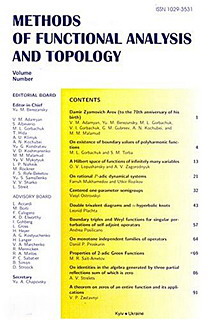O. Ostrovska
Search this author in Google Scholar
A class of representations of $C^*$-algebra generated by $q_{ij}$-commuting isometries
Olha Ostrovska, Vasyl Ostrovskyi, Danylo Proskurin, Yurii Samoilenko
MFAT 28 (2022), no. 1, 89-94
89-94
For a $C^*$-algebra generated by a finite family of isometries
$s_j$, $j=1,\dots,d$, satisfying the $q_{ij}$-commutation relations
\[
s_j^* s_j = I, \quad s_j^* s_k = q_{ij}s_ks_j^*, \qquad q_{ij} = \bar q_{ji}, |q_{ij}|<1, \ 1\le i \ne j \le d,
\]
we construct an infinite family of unitarily non-equivalent
irreducible representations. These representations are deformations
of a corresponding class of representations of the Cuntz algebra
$\mathcal O_d$.
Для $C^*$-алгебри, породженої скінченною сім’єю ізометрій
$s_j$, $j=1,\dots,d$, що задовольняє $q_{ij}$-комутаційним
співвідношенням
\[
s_j^* s_j = I, \quad s_j^* s_k = q_{ij}s_ks_j^*, \qquad q_{ij} = \bar q_{ji}, |q_{ij}|<1, \ 1\le i \ne j \le d,
\]
ми будуємо нескінченну сім'ю унітарно нееквівалентних незвідних
представлень. Ці представлення є деформаціями відповідного класу
представлень алгебри Кунца $\mathcal O_d$.
Unitary representations of Poincaré group ${\mathrm{P}(1,n)}$ in ${\mathrm{SO}(1,n)}$-basis
MFAT 27 (2021), no. 3, 258-276
258-276
This paper concerns the problem of reduction of unitary
irreducible representations of the Poincaré group
$\mathrm{P}(1,n)$ with respect to representations of its subgroup
$\mathrm{SO}(1,n)$. Based on a generalization of the Wigner-Eckart
theorem, we obtain matrix elements of the shift operators in the
$\mathrm{SO}(1,n)$-basis.
Робота присвячена проблемі редукції унітарних незвідних
представлень групи Пуанкаре $P(1, n)$ відносно представлень її
підгрупи $SO(1, n)$. На основі узагальнення теореми Вігнера-Еккарта
отримано матричні елементи операторів зсуву в $SO(1, n)$-базисі.
On isometries satisfying deformed commutation relations
MFAT 25 (2019), no. 2, 152-160
152-160
We consider an $C^*$-algebra $\mathcal{E}_{1,n}^q$, $q\le 1$, generated by isometries satisfying $q$-deformed commutation relations. For the case $|q|<1$, we prove that $\mathcal E_{1,n}^q \simeq\mathcal E_{1,n}^0=\mathcal O_{n+1}^0$. For $|q|=1$ we show that $\mathcal E_{1,n}^q$ is nuclear and prove that its Fock representation is faithul. In this case we also discuss the representation theory, in particular construct a commutative model for representations.

